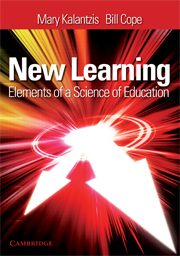Book contents
3 - Learning for work
from Part B - Contexts – Changing Conditions for Learning
Summary
Overview
Education prepares people for productive working lives – one of education's most important reasons-for-being. The types of work available in society influence the type of education that is considered most suitable. This chapter describes three main ways of organising work that have emerged since the beginning of the modern, industrial era, characterising these as ‘Fordism’, ‘post-Fordism’ and ‘productive diversity’. It examines the main dimensions of each of these forms of work: technology, management, workers' education and skills, and markets and society.
‘Fordism’ (named after Henry Ford, inventor of production-line manufacture) is a model of work in which the production process is divided into simple tasks, management is authoritarian and hierarchical, and uniform products are mass produced for mass consumption. For this kind of arrangement of work, didactic teaching is generally appropriate and sufficient.
The concept of ‘post-Fordism’ speaks to the gradual and uneven changes in the organisation of work in the later part of the 20th century towards automation, multi-skilling, teamwork, increased horizontal communication and human interaction in the workplace. This form of work is, by and large, better served by authentic education.
The concept of ‘productive diversity’ signals for us changes currently taking place in the organisation of work in what is now widely known as the ‘knowledge economy’: changes which locate value in human skills, relationships, culture, knowledge and learning, and in which working arrangements are more likely to have people with different skills working together, within enterprises and in organisational networks.
- Type
- Chapter
- Information
- New LearningElements of a Science of Education, pp. 49 - 70Publisher: Cambridge University PressPrint publication year: 2008



